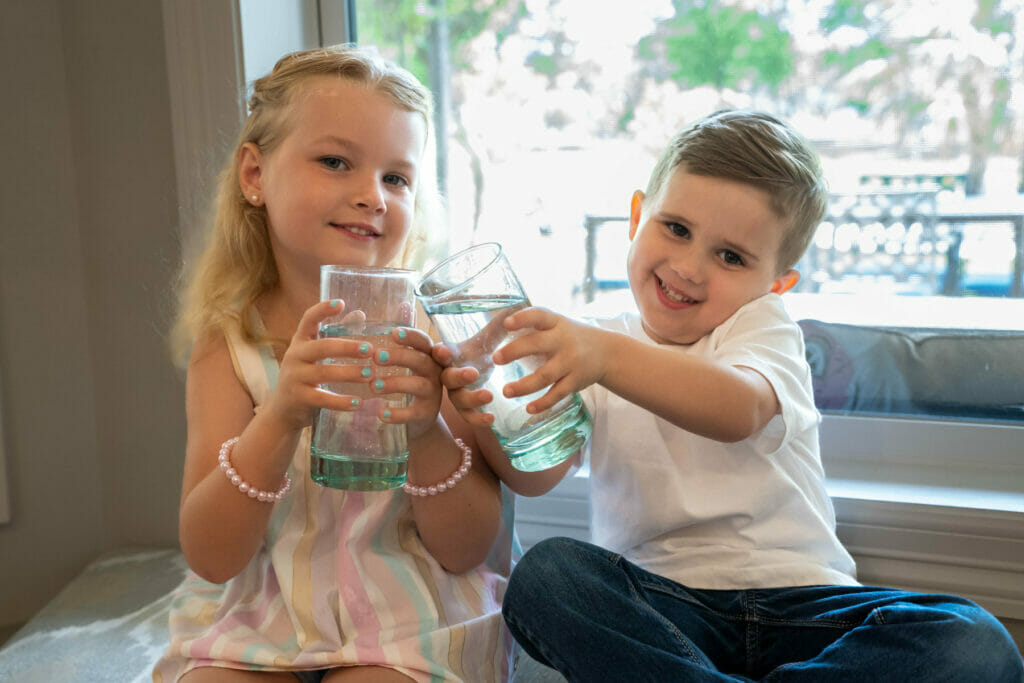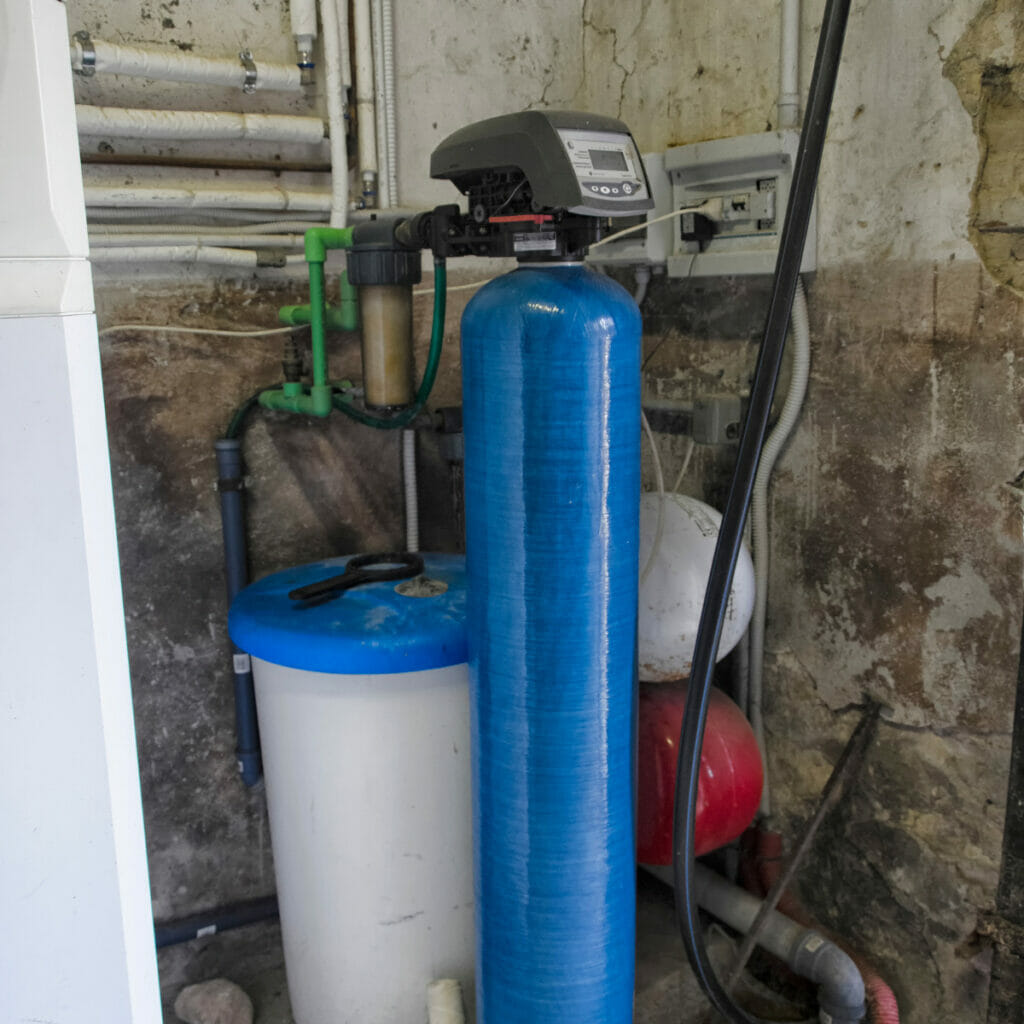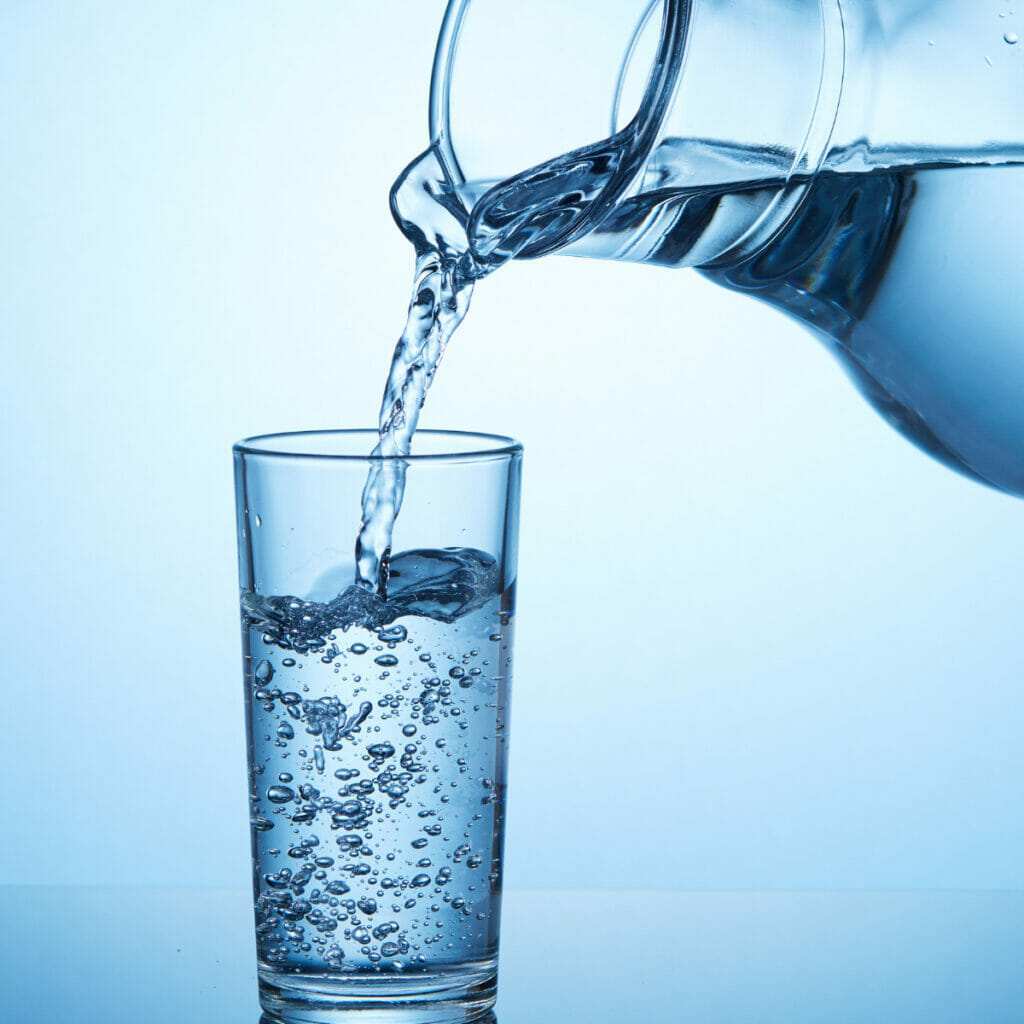Water is an essential part of our daily lives that many times we don’t stop to consider where it’s being sourced or the water quality we use. We assume we’re receiving the best possible water available.
Think about all the ways your household consumes water. You more than likely use water for cooking, drinking, bathing, and washing clothes. Water is crucial to everyday living.

What is the Water Filtration Process?
Water filtration is a process which contaminated water is forced through a fine filter. The filter enables the water to move through it, but removes contaminants in the water that are left behind.
Homeowners use a whole house system for different reasons, and there many advantages of filtering your water. Let’s learn more about the benefits of filtered water.
Benefits of a Water Filtration System
A water filtration system can eliminate any heavy metals, pesticides, mercury, lead, and arsenic which is in the water.
Water filters can lessen the amount of chlorine and other chemicals found in plain tap water.
The taste and smell of your drinking water is improved from filtration straight from your kitchen faucet because the filtration process can eliminate impurities and can remove bacteria.
A water filtration system gives you great tasting water without racking up a hefty bill from the high cost of buying plastic bottled water.
How Does a Water Filter Work?
Water filtering is a method used to filter out undesired chemical compounds, organic and inorganic materials, and biological contaminants from water. Without filtered water, there’s the risk of becoming ill from contaminated water.
Types of Whole House Water Filters
There are two main types of water filters for home use, backwashing filters and cartridge filters.
The right system will depend in part on what’s in your water, the concentration of the contaminant, and how fast you need the water to be treated.
Cartridge Whole House Water Filter System
Cartridge filters include one or more removable filters that have a limited lifespan and must be replaced regularly.
Contaminants in the water are typically trapped in the cartridge, and when that cartridge is all clogged up, it can be pulled out and replaced with a clean filter.
Depending on the quality of your water and what the filter is treating, it may need to be replaced every 3 to 12 months.
Backwashing Whole House Water Filter System
A backwashing water filter includes a large tank that contains a loose form of the filtering media. After a certain amount of water flows through the tank for treatment, the system is backwashed. In other words, water is pushed through the tank in the opposite direction and most of the contaminants are rinsed away.
While the filter media doesn’t last forever, it can often be used for several years before it needs to be replaced.
What is a Whole House Filter System?
A whole house water filter system treats water where the main water line enters your home, ensuring the water that flows from every faucet, every showerhead, and even in your washing machine, is clean and filtered.
Whole house water filters are point of entry filters. They are gateways for your tap water, and allow only fresh, filtered water to flow to your faucets making your drinking water crisp and clean and safe for your appliances. It can help reduce contaminants such as chlorine, iron, sulfur, biological contaminants, and more from your water.
Depending on which whole house filtration system you choose, your water will be processed through several levels of filtration to help catch as many impurities as possible. In general, a three-stage process takes places.
Pre-Filter Stage
This stage is designed to remove your water’s larger particulates and contaminants.
Advanced Carbon Stage
The next level of filtration helps to reduce chlorine and chloramines. Activated carbon binds and removes these contaminants in your water for an added layer of protection.
Fresh, Pure Water at Every Fixture
Activated carbon whole house filtration systems are great investments for the home and family. Activated carbon is also the most effective method of removing VOC’s, chloramines, and other harmful pathogens in the water.
Activated carbon has an absorptive nature; it is porous and has a large surface area. A whole house activated water filtration system has large tanks (number needed will depend on the size of the home and water usage) that house the activated carbon. They are hooked into the incoming water supply from the city, and that city water goes through a cleaning, or filtration process. The activated carbon absorbs the harmful elements and then the clean water is entered into the home’s supply.
Whole home water treatment systems are self-cleaning and require very little maintenance. They work on a timer that is set during installation and homeowners can rest easy that they are getting the cleanest, freshest, purest water for drinking, bathing, cooking, washing, and everyday use.
What is Activated Carbon Filtration?
Activated carbon filtration is the most effective method of removing the harmful elements while allowing the good minerals to remain. As long as it is a high-end system, reverse osmosis systems do the trick.
Post-Filter Stage
Any contaminants left in your water will pass through the post-filter. This stage helps to remove any remaining sediment and contaminants from your water before it reaches your taps.
Types of Whole House Water Filtration Systems
There are different types of filtered water methods but all offer the basics of the water purification process. This involves water that has been strained of harmful chemicals, pesticides, bacteria, and other contaminants present in the water.
Although public water systems, or city water, have filtration protocols in place, the water quality depends on where your water supply is sourced from originally, how the water is treated, and the quality of water pipes it flows through. Fortunately, there are several ways people can get filtered water.
Let’s review some water filtration options now.
Water Softeners
A water softener is the solution if you have hard water. Hard water is caused by a high concentration of dissolved minerals, specifically calcium and magnesium, and can wreak havoc in your home.

If you have stiff, faded laundry, soap scum in your shower, or chalky dishes, you most likely have hard water.
Hard water can also causes scale that clogs your pipes, decreases water pressure, and shortens the lifespan of your appliances.
Hard water can even affect your body, rendering your skin dry and itchy and your hair dull and frizzy. If your home is plagued by hard water, a whole house water softener is an investment that will ultimately save you a lot of money, as you will not have to pay for expensive repairs or replacements, such as your water heater due to scale build up.
Water Filtration Plus Water Softening
What water filter systems do not accomplish is softening the water. Water is considered hard at 7-8 grains of hardness.
Hard water is harmful to a home’s plumbing system, and is behind the cause of worn out seals, corroded pipes, and leaking water heaters. It also leaves spots on glassware and shower doors.
For the ultimate in-home water treatment, most specialists will recommend installing a water softener or water softening system, either salt or ionized with the water filtration.
This results in fresh purified water that is good to your skin and hair, and will ultimately help to eliminate some of the wear and tear on your home’s plumbing system.
Ultraviolet purification systems
Ultraviolet purification resolves the presence of living organisms, such as bacteria, viruses, parasites, and fungi, from your water source.
If you have well water, in the event of a natural disaster, or if you are put on a boil water advisory, an ultraviolet purification system can ensure your access to safe, filtered water. Plus, ultraviolet purification systems do not use chemicals and do not waste water.
Sediment Filters
A sediment filter maintains a clean, refreshing water supply. Sediment filters trap and remove a myriad of contaminants from water, such as dirt, sand, clay, and rust flecks from aging pipes.
Over time, sediment can clog your pipes, decrease water pressure, and damage your appliances, forcing you to pay for expensive repairs.
Sediment can even make your water unsightly and cloudy, also known as turbidity.
Carbon Filters
The primary function of carbon filters is to remove chlorine from water, as well as the chlorine taste and chlorine smell.
Chlorine is used in city water supplies to kill bacteria in water and in water pipes. While still safe to consume, water that smells and has an odor like chlorine is unsettling.
Carbon filters not only improves unpleasant tastes and the odor of your water supply, but also improves the safety. With a carbon filter, you can be confident that you are not consuming harmful substances from your tap water, as chemicals like pesticides and herbicides are also significantly reduced.
Acid Neutralizers
An acid neutralizer helps if you have acidic water. Acidic water has a pH of less than 7 and can cause serious damage to your pipes and appliances, including corrosion, leaks, and green-blue stains.
Pure, neutral water has a pH of 7, but becomes acidic as it absorbs carbon dioxide during the process of precipitation. Therefore, many wells have acidic water since their supply is often from shallow groundwater.
Chemical runoff can also cause acidic water, so it is important to protect your home and your health with an acid neutralizer.
Reverse Osmosis Filtration System
This process filters water through an ultra-thin, semi-permeable membrane, where it separates the tap water into pure liquid and a concentrate containing impurities. The liquid is saved to a storage tank for future use, while the concentrate trapped in the membrane is diverted down the drain.
Purified water stored in the tank is then subjected to an activated charcoal filtration process to rid it of all lingering tastes and odors before the water is dispensed in the household.
Reverse osmosis systems are very effective at reducing the level of pesticides, petrochemicals, and chloroform in drinking water.
Whole House Water Filters vs. Under Sink Options
A whole house water filter treats every drop of water in your home. The water you use to drink, cook, shower, brush your teeth, do laundry, and clean is all filtered. Your plumbing and appliances are also protected.
Under sink and countertop filters are mainly used to filter the water that you drink, cook with, and maybe run to an ice maker in the refrigerator.
What is the Cost?
Cost depends on the complexity of the filtration system you need to treat your particular water quality issue.
The cost of a whole house water filter is between a few hundred dollars and few thousand dollars. With that being said, keep in mind that whole house systems protect your pipes and appliances, so you will not have to pay for expensive repairs or replace your appliances as often.
Why is Water Filtration Important?
Whole house filtration systems remove a variety of contaminants from water and treat different water quality issues. It provides your home with cleaner water, and most importantly safer water to drink.
Your home’s water quality will determine which contaminants need to be removed, and in turn, which filter is the best choice for your home. Water testing will help determine your water quality.
Whole house water filters treat every drop of water in your home. The water you use to drink, cook, shower, brush your teeth, do laundry, and clean is all filtered. Your plumbing and appliances are also protected.
What Advantages Can a Water Filtration System Provide?
The quality of wateris essential for human health and general well-being. To ensure that you have good quality water, install a water filtering system. A water filtration system has many advantages. Let’s review these benefits.
Remove Contaminants
You cannot be sure whether the water that reaches your tap does not have contaminants. The water company may treat the water and remove all the contaminants. However, as the water gets from the source to your tap, it may get contaminated along the way.
The only way to be assured that the water is free of any contamination, is by installing an advanced water filtration system to help achieve it.
Efficient and Cost Effective
A water filtration system that will purify water for the whole house will ensure efficient delivery of safe water and is cost effective.
Rather than finding new ways of purifying water that come out of every tap in the house, get an advanced water filtration system that will purify and supply the whole house with clean water. It is the best budget friendly way to get clean water from every water source in the house.
Health Benefits
Water is vital for every cell and organ in the body. Without water, the body becomes dehydrated, and one will not feel healthy and fit.
One of the health benefits of purified water is it keeps the skin healthy. This is because impure water contains chlorine, chloramines, heavy metals, and other impurities that irritate the skin and aggravate skin problems.
Drinking Water
Tap water may not always be safe for drinking, and this is why people opt to buy bottled water. This may prove to be expensive in the long run compared to having a water filtration system installed in your house.

Apart from the cost saving benefits, it also reduces the stress of having to go and buy water every time you run out. With a water filter installation system installed in your house, you will save money in the long run, and you do not have to worry about making a water run.
Do I Need a Whole House Water Filtering System?
If your home’s water supply contains harmful contaminants or generally poor quality, there is a whole house filtration system that can be the solution.
If you use well water, there may be a need to remove any sediment present or other contaminants in your water, or to disinfect your water.
If you are on city water, you may want to rid your water of the smell and taste of chlorine. A whole house filtering system is designed to remove anything that is troublesome from your water.
Things to Consider
Take time to consider some important factors that can help you make the best choice, including the type of contaminants, flow rate, and installation requirements.
With an understanding of these features, it becomes easier to decide which option would be the best whole-house water filter for your home.
Types of Contaminants
A wide variety of contaminants can affect the incoming water supply, both from city water and well water. Common contaminants include disinfectants, sediment, microorganisms, heavy metals, and organic chemicals. Testing your water and knowing what is in your water will help decide which water treatment system works best for you.
Water Flow Rate
The water flow rate of a whole-house water filter determines the maximum amount of water that can pass through the filter in a given time period.
A whole-house water filter needs to have a water flow rate high enough to adequately supply large appliances, like showers and dishwashers, and your daily use.
Signs I need a Water Filter System
Problem water can leave stains, have a foul odor or even taste bad. Signs that you may need a whole home water filter system are:
- A rotten egg smell coming from your drinking water
- Streaks on your dishes and deposits on plumbing fixtures
- Dry hair or skin after showering
- Bad flavors in your drinking water
- Rust stains on your appliances
- Corroded pipes
What is My Best Filtration Option?
Filters commonly found in homes include systems from a water filter pitcher, end-of-tap or faucet-mounted filters, faucet-integrated (built-in) filters, on-counter filters, under-sink filters, and whole-house treatment units.
Filters are designed to reduce different types of contaminants in your water. Your water quality will depend on where you live and where your water supply is from. Having a water test completed will help determine the best water filter option available for your needs.
Contacting the Water Filter Experts in Rockwall, TX
At Intown Plumbing, our goal is for you to have a clean, trustworthy water supply that is kind to you, your appliances, and your home.
If you have any questions regarding whole house water filtration or how to choose the best filter for your home, don’t hesitate to contact us today.

